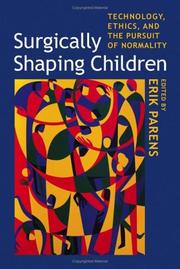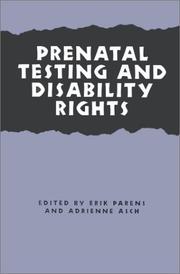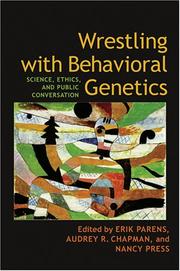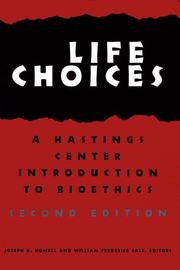| Listing 1 - 6 of 6 |
Sort by
|
Book
ISBN: 0878407030 Year: 1998 Publisher: Washington Georgetown university press
Abstract | Keywords | Export | Availability | Bookmark
 Loading...
Loading...Choose an application
- Reference Manager
- EndNote
- RefWorks (Direct export to RefWorks)
New biotechnologies - ranging from genetic manipulation to pharmacology and new surgical techniques - are rapidly making it possible to enhance an individual's appearance, mood, mental and physical abilities, and even personality in ways previously only imagined. In this volume, scholars from philosophy, sociology, history, theology, women's studies, and law explore the looming ethical and social implications of these new biotechnologies.
241.63*2 --- Medical innovations --- -Medical innovations --- -Psychotropic drugs --- -Surgery, Plastic --- -Performance technology --- -#SBIB:17H20 --- #SBIB:316.334.3M11 --- #SBIB:003.IO --- biotechnologie --- verbetergeneeskunde (mensverbetering) --- samenleving (sociale aspecten) --- ethiek (ethische aspecten) --- Human performance technology --- Technology, Performance --- Performance --- Aesthetic surgery --- Cosmetic surgery --- Plastic surgery --- Reconstructive surgery --- Surgery, Aesthetic --- Surgery, Cosmetic --- Surgery, Reconstructive --- Transplantation of organs, tissues, etc. --- Plastic surgeons --- Psychiatric drugs --- Psychoactive drugs --- Psychopharmaceuticals --- Drugs --- Drugs of abuse --- Psychopharmacology --- Psychotropic plants --- Innovations, Medical --- Medicine --- Medical technology --- Technological innovations --- Theologische ethiek: medische ethiek: dokter; verpleegster; ziekenhuis --- Moral and ethical aspects --- Social aspects --- Sociale wijsbegeerte: algemeen --- Medische sociologie: concepten en theorieën --- médecine de l'amélioration (médecine d'amélioration) --- société (aspects sociaux) --- ethique (aspects ethiques) --- Innovations --- Performance technology --- Psychotropic drugs --- Surgery, Plastic --- Moral and ethical aspects. --- Social aspects. --- 241.63*2 Theologische ethiek: medische ethiek: dokter; verpleegster; ziekenhuis --- #SBIB:17H20 --- Society and medical innovations --- Enhancement technology, Human performance --- HPT (Human performance technology) --- Human performance enhancement technology --- Human engineering

ISBN: 0801883059 9780801883057 9780801889165 0801889162 9780801890901 080189090X Year: 2006 Publisher: Baltimore, Md. : Johns Hopkins University Press,
Abstract | Keywords | Export | Availability | Bookmark
 Loading...
Loading...Choose an application
- Reference Manager
- EndNote
- RefWorks (Direct export to RefWorks)
Explores the ethical and social issues raised by the proliferation of surgeries designed to make children born with physical differences look more normal. This volume offers examinations of the significance of surgical alteration through narratives, theoretical reflections, and suggestions about how to improve the decision-making process.
Abnormalities, Human --- Achondroplasia --- Biomedical Technology --- Child. --- Children --- Cleft Palate --- Decision making in children. --- Genitalia --- Reconstructive Surgical Procedures --- Social Perception. --- Surgery, Plastic --- Moral and ethical aspects. --- surgery. --- ethics. --- Surgery --- Decision making. --- Abnormalities. --- Decision making in children --- chirurgie (heelkunde) --- ethiek van de technologie (technologiekritiek, technologiemisbruik) --- kinderen --- kosmetische chirurgie --- lichaam --- verbetergeneeskunde (mensverbetering) --- Aesthetic surgery --- Cosmetic surgery --- Plastic surgery --- Reconstructive surgery --- Surgery, Aesthetic --- Surgery, Cosmetic --- Surgery, Reconstructive --- Transplantation of organs, tissues, etc. --- Plastic surgeons --- Child psychology --- Childhood --- Kids (Children) --- Pedology (Child study) --- Youngsters --- Age groups --- Families --- Life cycle, Human --- Abnormalities --- Anomalies, Congenital --- Birth defects --- Congenital abnormalities --- Congenital anomalies --- Defects, Birth --- Deformities --- Developmental abnormalities --- Human abnormalities --- Malformations, Congenital --- Morphology --- Pathology --- Teratogenesis --- Teratology --- Moral and ethical aspects --- Surgery&delete& --- Decision making --- chirurgie --- éthique de la technologie (critique de la technologie, abus de la technologie) --- enfants --- chirurgie cosmétique --- corps --- médecine de l'amélioration (médecine d'amélioration) --- Achondroplasty --- Chondrodystrophia foetalis --- Fetal rickets --- Rickets, Fetal --- Bones --- Dwarfism --- Fetus --- Metabolism, Inborn errors of --- Palate, Cleft --- Palate --- Generative tract --- Genital organs --- Genital system --- Genital tract --- Genitals --- Organa genitalia --- Reproductive organs --- Reproductive system --- Reproductive tract --- Sex organs --- Sexual organs --- Genitourinary organs --- Reproduction --- Cognition, Social --- Interpersonal perception --- Social cognition --- Interpersonal relations --- Perception --- Social cognitive theory --- abnormalities. --- Diseases

ISBN: 0878408045 0878408037 Year: 2000 Publisher: Washington Georgetown university press
Abstract | Keywords | Export | Availability | Bookmark
 Loading...
Loading...Choose an application
- Reference Manager
- EndNote
- RefWorks (Direct export to RefWorks)
As prenatal tests proliferate, the medical and broader communities perceive that such testing is a logical extension of good prenatal care—it helps parents have healthy babies. But prenatal tests have been criticized by the disability rights community, which contends that advances in science should be directed at improving their lives, not preventing them. Used primarily to decide to abort a fetus that would have been born with mental or physical impairments, prenatal tests arguably reinforce discrimination against and misconceptions about people with disabilities.In these essays, people on both sides of the issue engage in an honest and occasionally painful debate about prenatal testing and selective abortion. The contributors include both people who live with and people who theorize about disabilities, scholars from the social sciences and humanities, medical geneticists, genetic counselors, physicians, and lawyers. Although the essayists don't arrive at a consensus over the disability community's objections to prenatal testing and its consequences, they do offer recommendations for ameliorating some of the problems associated with the practice.
Prenatal diagnosis --- Legal status, laws, etc. --- Moral and ethical aspects. --- #SBIB:316.334.3M30 --- #SBIB:316.334.3M20 --- prenatale diagnostiek (prenatale test) --- handicap --- selectieve abortus --- Medische sociologie: gezondheidsgedrag --- Sociale epidemiologie en etiologie: sociale aspecten van ziekte en gezondheid --- diagnostic prénatal (test prénatal, DPN) --- invalidité (handicap) --- avortement sélectif --- Antenatal diagnosis --- Intrauterine diagnosis --- Prenatal testing --- Legal status, laws, etc --- Moral and ethical aspects --- Diagnosis --- Obstetrics
Book
ISBN: 0190940360 9780190940362 Year: 2019 Publisher: New-York: Oxford university press,
Abstract | Keywords | Export | Availability | Bookmark
 Loading...
Loading...Choose an application
- Reference Manager
- EndNote
- RefWorks (Direct export to RefWorks)
International uproar followed the recent announcement of the birth of twin girls whose genomes had been edited with a breakthrough DNA editing-technology. This technology, called clustered regularly interspaced short palindrome repeats or CRISPR-Cas9, can alter any DNA, including DNA in embryos, meaning that changes can be passed to the offspring of the person that embryo becomes. Should we use gene editing technologies to change ourselves, our children, and future generations to come? The potential uses of CRISPR-Cas9 and other gene editing technologies are unprecedented in human history. By using these technologies, we eradicate certain dreadful diseases. Altering human DNA, however, raises enormously difficult questions. Some of these questions are about safety: Can these technologies be deployed without posing an unreasonable risk of physical harm to current and future generations? Can all physical risks be adequately assessed, and responsibly managed? But gene editing technologies also raise other moral questions, which touch on deeply held, personal, cultural, and societal values: Might such technologies redefine what it means to be healthy, or normal, or cherished? Might they undermine relationships between parents and children, or exacerbate the gap between the haves and have-nots? The broadest form of this second kind of question is the focus of this book: What might gene editing―and related technologies―mean for human flourishing? In the new essays collected here, an interdisciplinary group of scholars asks age―old questions about the nature and well-being of humans in the context of a revolutionary new biotechnology―one that has the potential to change the genetic make-up of both existing people and future generations. Welcoming readers who study related issues and those not yet familiar with the formal study of bioethics, the authors of these essays open up a conversation about the ethics of gene editing. It is through this conversation that citizens can influence laws and the distribution of funding for science and medicine, that professional leaders can shape understanding and use of gene editing and related technologies by scientists, patients, and practitioners, and that individuals can make decisions about their own lives and the lives of their families.
Gene Editing --- Humanism --- Quality of Life --- Happiness

ISBN: 0801882249 Year: 2005 Publisher: Baltimore (Md.) : Johns Hopkins university press,
Abstract | Keywords | Export | Availability | Bookmark
 Loading...
Loading...Choose an application
- Reference Manager
- EndNote
- RefWorks (Direct export to RefWorks)
Behavior genetics --- Genetics, Behavioral --- Genetics, Behavioral. --- ethics.


ISBN: 087840757X Year: 2000 Publisher: Washington Georgetown University Press
Abstract | Keywords | Export | Availability | Bookmark
 Loading...
Loading...Choose an application
- Reference Manager
- EndNote
- RefWorks (Direct export to RefWorks)
Medical ethics. --- bio-ethiek (medische, biomedische ethiek, bio-ethische aspecten) --- gezondheidseconomie (gezondheidszorgeconomie) --- abortus (vrijwillige zwangerschapsafbreking) --- levenseinde (einde van het leven, levenseindebeslissing) --- pasgeborene (zuigeling, neonatus, pasgeboren kind) --- euthanasie --- voortplanting (reproductie) --- embryostatuut (moreel statuut van het embryo, juridisch statuut van het embryo, potentiële persoon) --- orgaandonatie --- lichaamsmateriaal (lichaam, menselijk lichaamsmateriaal) --- genetische screening --- genetische engineering (manipulatie) --- kloneren (klonen, therapeutisch kloneren, reproductief kloneren) --- bioéthique (éthique médicale, biomédicale, aspects bioéthiques) --- économie de la santé (économie des soins de santé) --- avortement (interruption volontaire de grossesse, IVG) --- fin de vie (décision de fin de vie) --- nouveau-né --- procréation (reproduction) --- statut de l'embryon (statut moral de l'embryon, statut juridique de l'embryon, personne potentielle) --- don d'organes --- matériel corporel humain, (corps humain) --- dépistage génétique --- génie génétique (ingénierie génétique) --- clonage (clonage thérapeutique, clonage reproductif) --- Medical ethics --- Biomedical ethics --- Clinical ethics --- Ethics, Medical --- Health care ethics --- Medical care --- Medicine --- Bioethics --- Professional ethics --- Nursing ethics --- Social medicine --- Moral and ethical aspects
| Listing 1 - 6 of 6 |
Sort by
|

 Search
Search Feedback
Feedback About
About Help
Help News
News